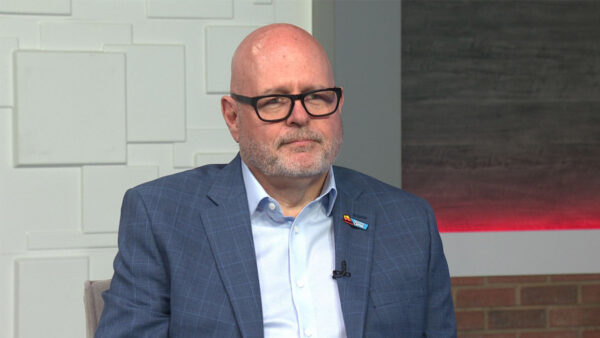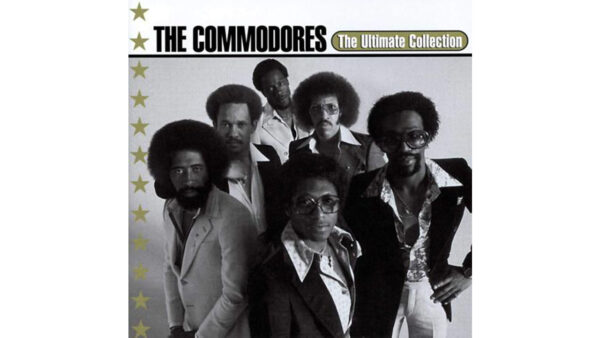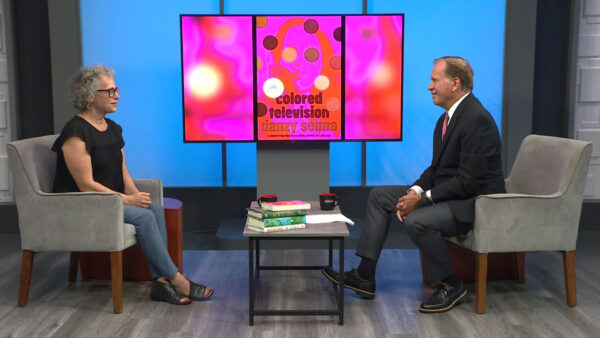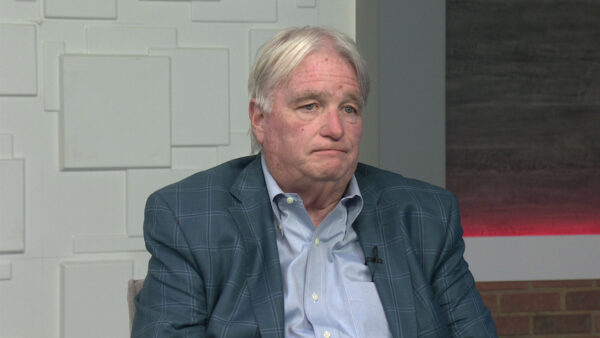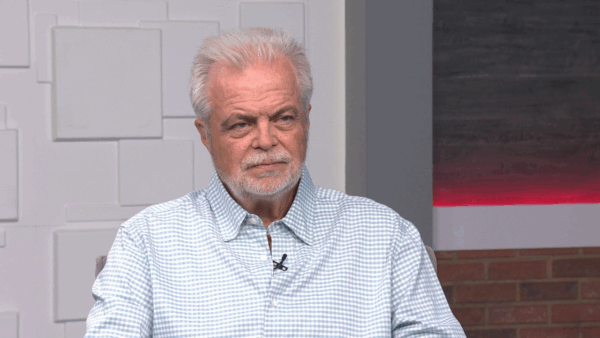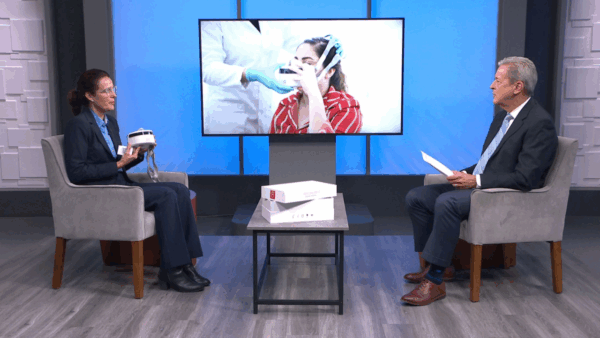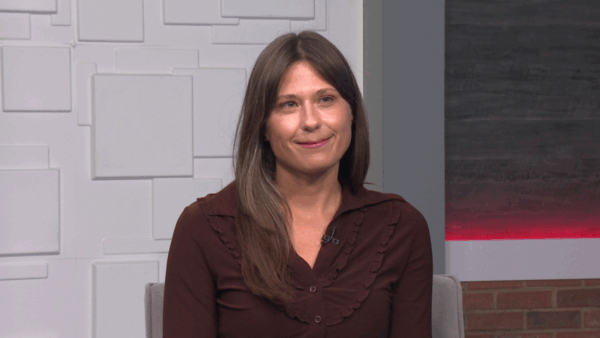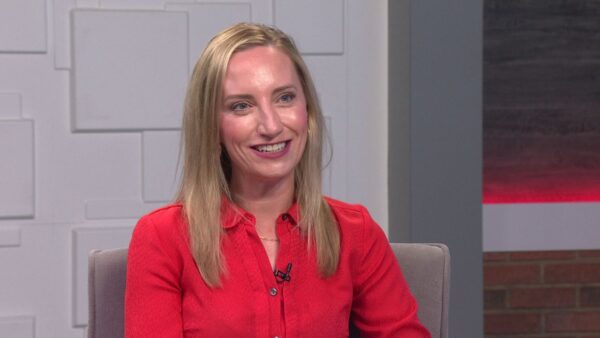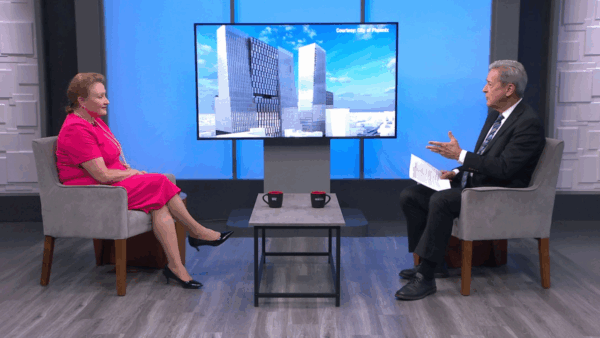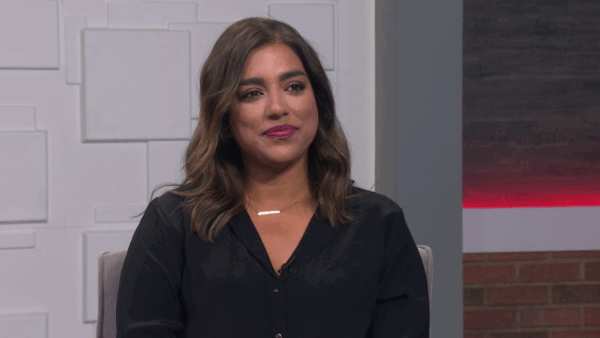Governor Janet Napolitano makes her monthly stop in the HORIZON studio to talk about issues affecting the state, including immigration bills and other measures making their way through the legislative process.
Michael Grant:
Tonight on Horizon. Another big immigration march planned in Phoenix next week, and one lawmaker is calling on the governor to send out the National Guard. The state's school chief has succeeded in at least temporarily halting the immediate spending of funds for English learners and the governor tries to bury the hatchet with lawmakers. We'll discuss all those topics with the governor, next on Horizon.
Announcer:
Horizon is made possible by contributions from The Friends of 8. Members of your Arizona PBS station.
Michael Grant:
Welcome to Horizon. Good evening, I'm Michael Grant. Once a month, Arizona governor Janet Napolitano comes to the Horizon set to discuss the latest issues. We call it "First Thursday: the governor on Horizon." we'll talk to the governor about a variety of issues affecting our state, including the issue that is impossible to escape: Immigration. Here now is Arizona governor Janet Napolitano.
Michael Grant: I'm going to avoid the obvious comment about burying the hatchet where--[laughter]
Janet Napolitano: We'll pick that up later.
Michael Grant: We'll move right along.
Michael Grant:
Slightly more seriously, they've got another march planned for next Monday, April 10. At least tentatively I think the route is down Grant Avenue to downtown and then to the state capitol. I've heard varying estimates. Certainly they are expecting a crowd of at least 20,000. Are you concerned about security in the state capitol?
Janet Napolitano:
I think this one because there's been a lot of notice there's a lot more opportunity for planning and the march organizers have been working closely with the police department, department of public safety and others to make sure that it's a safe march and that people know ahead of time the routes and streets that it will follow. But it will be part and parcel of a national day of marches all over the United States. And I think that it has the potential of being one of the largest marches we've ever had in Arizona. So we want to do everything we can to make sure it goes safely and goes well.
Michael Grant:
One concern is just with that number of people on a workday. Do you bring state government to a halt? Can you just simply handle the have been?
Janet Napolitano:
Yeah. We actually had a planning meeting this afternoon. Our plan right now is no state government stays open. We will encourage flextime, telecommuting when appropriate; were looking at how we get state employees out of office buildings, Not so much in but out I think out is really something we need to plan for. Parking and so forth. But my intent is that state government stays open and the march goes on.
Michael Grant:
Is your intent to use the National Guard?
Janet Napolitano:
Not currently, no. I know some lawmakers have talked about that. But the lead law enforcement agency on this will be the Phoenix police department since the march will be within the city of Phoenix. They'll be coordinating with the department of public safety and also with the capitol police and indeed with the March organizers who also want to make sure that everything goes well. So this is a plan to be a peaceful march, it's planned to be a rally. It's a plan to be people expressing their first amendment rights and calling out the military without anything more than that plan would not be right. But on the other hand, that many people on the streets you have to have a law enforcement plan and that's in place.
Michael Grant:
Do you have very many details on -- obviously there is a march. Obviously there is a rally. But have you received any additional -- I mean, for example are there going to be speeches, physical platforms set up? Will it be that kind of function?
Janet Napolitano:
My understanding is of when we're taping this show is that people will be invited to assemble at the state fairgrounds. And there will be music and so forth there for several hours while people assemble. Then they'll begin the march. And when they get to the capitol there'll be roughly a hour's worth of speeches and those are going to be preplanned and pretimed and then people will return back.
Michael Grant:
We have been talking about this on the Friday edition the past couple of Friday. So let me put it to you: from a political standpoint, from a voter political standpoint, do you see any potential for a backlash here? People look at this kind of March activity. And it sort of takes the immigration issue an additional notch up in terms of what their concerns are and they vote. I suppose this could be played out either way.
Janet Napolitano:
I could argue it either way. I think really what has happened is that the federal government has let this issue fester for so long. And for so long the kind of what I would call the immigrant bashing has been the focus of debate in the congress and indeed in the state legislature that finally people say, hey, wait a minute. Enough is enough. I'm here lawfully, I work, my family is here. We want our voices heard as well. And I think the precipitating event for this march was the house passed an immigration bill which makes it a felony for anyone to be in the country illegally. And I think people in Arizona who have been up on the front lines of this immigration issue for so long realize, "that's a draconian bill that is a bumper sticker but not a solution. And what Washington needs to do is give us a solution." I'm encouraged by the senate bill, the McCain bill. I have been out in front saying that is the kind of holistic approach we need to that this.
Michael Grant:
Here is the issue for many people. It's hard to imagine this issue kicking up a further notch for November. But you mentioned we're here lawfully. I think a lot of people say, hold it. You're not here lawfully. Looking at immigrants.
Janet Napolitano:
I'm looking at the people who are organizing the march on Monday. They're ministers, they're people who are representatives of state government and so forth. But beyond that, what we need is, you know, we need law enforcement aspect to this. It's true. More law enforcement at the border. I've had a $100 million package pending for months at the legislature now to help with that. But we also need a law that's enforceable and recognizes what's going on and deals realistically with the 11 million people who are already here by imposing a fine saying, you have to pay your taxes, learn to speak English then apply for citizenship. That's where our country has stood in the past and it hasn't served us too badly.
Michael Grant:
I understand. And I think you can make a case that the reason amnesty didn't work in the mid 80's was you didn't have any forward-looking aspects. For example, I guess a worker program, or other aspects. You didn't make any further provisions.
Janet Napolitano:
There was that. Nor have we ever resourced the immigration service or border patrol to do any interior enforcement win within the united states. We invested billions of dollars in the border, particularly San Diego or El Paso, funneled these people with a very dangerous area to cross in the desert. But we said, boy, if you get through do we have a job for you because there's no enforcement once you get through the border. My view, immigration reform you need to have a lot more enforcement at the border and then once you have that law you have to enforce it within the interior of the United States as well.
Michael Grant:
Do you think we're making any progress at all with Mexico? Because sure, we've got an economic magnet here. But Mexico certainly doesn't help with living conditions, wage conditions and other things down there. And of course we've discussed before the fact that many respects they seem to be actively encouraging illegal immigration over the border.
Janet Napolitano:
I've had great cooperation with my fellow in the state of son another Sonora. They're as affected as people moving from south to north as we are because they stage in Sonora before they move into Arizona.
Michael Grant:
I think the problem is Mexico city.
Janet Napolitano:
Exactly. I want to make that very important point that at the state level we've been cooperating on law enforcement, joint protocols, for exchanging information, going after the money launders, putting checkpoints on the road, all those practical on the ground things. But our respective nation's capitals are just now beginning to engage in a substantive way. And of course this year Mexico has its own presidential election. That will change the debate down there. But, yeah, we need more from Mexico and we need Washington, D.C. to really grapple with this issue. It's a hard issue. If it were an easy issue you'd snap your fingers and solve it. It's a hard issue. It has a lot of elements to it. But this is something Washington, D.C. needs to take on.
Michael Grant:
You mentioned the House of Representatives action on making illegal dealings on felons. Let me shift to the state version of that. I assume you have the same kind of feelings on the bill that I think is currently moving to conference committee between the house and senate. Senator Leff was on earlier in the week. One of the points she made is that at least one of its intents is to give local law enforcement officials a way to hold illegal aliens so you don't have the situation, for example, that you had in Mesa awhile back where they caught a van load of illegal aliens, called for the border patrol, border patrol never showed up, finally they had to let them go. And you got illegal aliens running through neighborhoods and those kinds of things. See any merit at all to that.
Janet Napolitano:
There's other ways to handle that other than this bill. Law enforcement throughout Arizona hates this bill. They view it as an unfunded mandate to them yet again and legislature yet again is not listening to law enforcement where real immigration enforcement is concerned. Law enforcement is very frustrated with this bill.
Michael Grant:
It doesn't tell them to arrest. Doesn't tell them they have to arrest.
Janet Napolitano:
Again it creates an unrealistic expectation. It's also got some legal issues involved with it. Because similar legislation --
Michael Grant:
New Hampshire?
Janet Napolitano:
New Hampshire is held to say, look, this is basically just a substitute for immigration law. And that can only be passed by the federal government. There are lots of issues there. The bill hasn't yet reached my desk. But I have yet to receive a dollar from this legislature for law enforcement, for immigration. So all these other bills to me are rather hollow. Kind of like everything else they've sent me the last couple years on immigration. I say to them as to the federal government, you have to resource this issue and resource it intelligently, resource it well and recognize that at base this is a federal issue.
Michael Grant:
House committee has approved -- admittedly it hasn't gotten you but house committee has approved a bill that would spend $50 million over the next couple of years to build a smart fence? Think that's a smart idea?
Janet Napolitano:
It could be -- nice pun.
Michael Grant:
I made that up on the spot.
Janet Napolitano:
Very good. Here's the thinking on that. I think using technology is smart for the border and will help us. The problem we have -- and we've tried to communicate this with the legislature -- before we spent $50 million of state tax payer money, my understanding the federal government is ready to install their own radar fence down there. So we could have this odd situation of after nothing happening on the federal side they're pouring money down there for radar and then we have not one but two radar fences. We need to coordinate with the federal government, if indeed they have the resources and are going to do it. That's a big if because they're they've made lots of promises. But if they are going to do it we can hold the state money back.
Michael Grant:
I believe the bill tracking through the united states senate has some French -- didn't mean to say fence -- similar aspects to it.
Janet Napolitano:
Yes. But this is way ahead of that. The bill going through is not an appropriated bill. But my understanding is that the border patrol actually here is planning right now to install smart fencing. Smart fencing is kind of the nickname for using radar and other technologies on the ground to enhance the manpower. So again, I think the radar is something that I think has a lot of potential. But the bill needs to be crafted so that we don't run into unwittingly into a duplicative situation.
Michael Grant:
People expect me to ask you this. I need to cycle back to the illegal alien felony bill. You're not going to answer it but people expect me to answer it. [laughter]
Michael Grant:
Are you going to veto that bill?
Janet Napolitano:
I don't comment on bills s until they get to my desk.
Michael Grant:
We could script that.
Janet Napolitano:
Yeah. I could just hold up my sign and say, answer a, answer b.
Michael Grant:
How do you read the ninth circuit and the temporary stay on judge Collins' order on going ahead and distributing the fine?
Janet Napolitano:
Oh, I think it's a temporary stay, which is fairly standard in the ninth circuit. I think it's designed to give the judges time to read the pleadings and so forth so I won't read too much into it. On April the third Monday of this week they had oral argument on the underlying bill. And I hope the judge rules quickly on that in terms of whether the underlying bill which I feel is insufficient but allowed to go into law so it could get to the court and the court could address it but the underlying bills to me do not meet the standards required by federal law.
Michael Grant:
Give me what you think -- I think one of the reasons why people have difficulty engaging on this issue is they don't understand the issue. Incidentally, that many times includes me as well. What's your key objection to what the legislature passed?
Janet Napolitano:
Well, it's two-fold. One is, the money they appropriate -- here's what we're talking about. We have a million children in school in Arizona, 160,000 of them come from homes that don't speak English much we have to teach them how to read, write and speak in English as well and quickly as we can. Otherwise they lose the opportunity to succeed academically in school and we're well on the road to creating a permanent economic underclass. So it is in our economic and every best interest in the world to get those kids proficient in English. That means teachers and teaching assistants and smaller classes and all of those sorts of things and that costs money.
Michael Grant:
So it's just money. More money.
Janet Napolitano:
No, it's not. Part of it is money. And the money the legislature appropriated, there is nowhere -- there is no basis in any study, any document ever that says they have ever appropriated enough. The second is the process by which school districts have to jump through hoops every year to try to get the money and the creation of a whole new bureaucracy within the department of education as opposed to doing it more on a formula basis with accountability where we go in and be able to audit and so forth and make sure the money is being spent appropriately and well.
Michael Grant:
One of the attorneys at the hearing on Monday said the Nogales Unified school district has been doing very well under this system. If the Nogales unified system can do it any school district can do it. What's wrong with that argument?
Janet Napolitano:
First of all I think that's based on a statement by a former superintendent who was only with that district a short time and is no longer there. Certainly that is not the point of view of every other school district in the state. They've all filed previous saying, when you really look at a quality E.L.L. Program, English language learner program that gets kids proficient so they can pass the aims test at the same rate at their Peers and so forth, most of those programs are north of $900 million a year that they can document. This is what we spend to make sure these kids learn English.
Michael Grant:
432 is the current level?
Janet Napolitano:
432. I think you can't take one isolated example not based on true experience but based on isolated statements six years ago in a hearing. That's when Nogales said that to a whole statewide system. That's why the school districts don't like the legislative bill, the school boards don't like it, the Arizona board of education doesn't like it. Again my view is Arizona needs a highly-educated English-speaking work force for its long-term future and this bill doesn't get us there.
Michael Grant:
Almost out of time, you let the tuition tax credit go into law without your signature in the hope it might bury the hatchet with the legislature. Do you sense any calming of relations there?
Janet Napolitano:
Well, I think they reduced it from 850 million to 50 million to 5 million with a hard cap. So I said, you know what? I'm going to let that go. Get that issue off the table. Let's talk about the big issues. Teacher pay. Let's talk about all day kindergarten, let's talk about funding for universities, let's talk about additional raises for public safety, particularly the department of corrections, department of public safety where we need to keep officers, let's talk about building a water infrastructure fund, paying of some of our debts. If that $5 million issue was keeping us from getting on with it.
Michael Grant:
Get off of it. Governor Janet Napolitano, thank you.
Michael Grant:
Governor Napolitano has gathered more than enough $5 contributions to qualify for clean elections funding in less than a month after announcing she is running for governor again. The last time she ran, it took her three months to reach the minimum 4200 valid $5 donations required to receive public campaign financing. Republican Len Munsil has gathered at last report 4500 signatures. At the time of taping, neither candidate had filed their donations with the citizen's clean elections commission. The Goldwater institute, recently released a report researching a local right-leaning research organization, recently debated clean elections based on a report it's done on Arizona's public campaign financing law. Here are some excerpts from that debate.
Mike Sauceda:
A small gathering listened to the Goldwater institute's critique of the Arizona clean finance law. The institution which does not favor public campaign financing criticized clean elections on several points. It complains clean elections has not increased competition in elections.
Allison Hayward:
The other thing we looked at that was one of the promises was competition. Incumbent re-election rates are -- were falling and the clean elections in other states took this as great news. Incumbent victory margins were falling and clean elections took this as great news. In 2004 those trends reversed getting less competitive, which is to say incumbent re-election rates were rising. Great news if you're an incumbent. There may be incumbents here.
Mike Sauceda:
Todd Lang, executive director of the clean elections commission provided a rebuttal of the clean elections report.
Todd Lang:
How is the competition doing? Do we have more competition? Well again the total number of candidates went down in 2004 and as she acknowledges and I think redistricting is a big part of that. Clean elections is designed to help folks who want to run and don't want to take private contributions or don't have access to the big money contributions. It's not going to change a noncompetitive district into a competitive district. If you're a person who thinks I want to run and clean elections is the only way I'll be able to do it but the percentages just don't favor me they may rethink it. If you have a competitive district I think you'd find a very difficult result.
Mike Sauceda:
The Goldwater report also looked at the effect on voter turnout.
Allison Hayward:
There's no trend, Really. Now, that is voter turnout as a person percent of voter registration. Some people don't like to use that particular metric and would prefer to use voter turnout as percent of voting age population. Of course in fast growing states like Arizona there is reason to believe that might be a hard metric to use, too. Either way you measure it, no indication that the clean elections law has done anything to stimulate voter turnout necessarily.
Todd Lang:
She points out that turnout has not been rising a great deal over the last few years. I know -- and she alluded today it to be fair that from 1999 to 2002 there was a big increase in turnout. She pointed out that fluctuates. She also pointed out what I think is the key issue, redistricting. Without the competitive districts I think you're going to have issues with the effectiveness of some of the reforms. Ultimately I think this is a false argument. Because really that wasn't the focus of the voters of Arizona when they enacted this law. What it's really about is communication with candidates, about new candidates being able to run, candidates who have good ideas who would make a quality candidate but don't have access to that special interest money, the big donors. The ability of folks to respond to attack ads, the ability to of folks to run effective campaigns ultimately more speech.
Mike Sauceda:
The clean elections commission looked at clean elections from the standpoint of the number of people who make a $5 contribution on their tax forms. That's up to 9%. But the report said the increase was due to people wanting to save money on their taxes although you have to make a contribution to get the credit. Form elections commission chairman Brad Smith talked about that.
Brad Smith:
Why don't more people participate? 25% participate. You get $5 for participating. All right, you, sir, Paul Green. If you will put a check on your pad right now I will give you $5. You don't think I'm serious, do you? No. Brad Smith: Okay. But if you thought I was serious you'd check that box. There was $5 on the floor I'd lean over and pick it up and I'll a well-off guy. Amazing to me that people in Arizona say, no, I'm not going to put a check in the box to get $5. The fact that more people aren't doing it may be more people not saying, hey, you get $5 if you check that box. What the heck.
Todd Lang:
We noted that they're up. I agree. I think it's an indicator of support of it went from 14% in 2001 to 25% last time. She points out economic self interest. But what I'd say is, did we suddenly get smarter in 2004? No. We had economic self interest back then. What I think this is an indication of is the fact that folks are starting to support clean elections more and more. The test isn't -- you know, you could talk about party preference and whether republicans like it less than democrats. But is participation increasing? I think the numbers bear it out. When you look at contributions what would I suggest you add to your study? What are we missing here? The essence of clean elections, the $5 contribution form which many of you have been asked to sign and some of you with distaste. That's the essential element of clean elections. Under the language it enables folks to participate in a more meaningful way. They're really part of the system. It encourages direct communication between candidates and voters.
Mike Sauceda:
The event closed with a question and answer session with the speakers.
Michael Grant:
Thank you very much for joining us on this Thursday evening. I hope you can be here tomorrow for the Friday edition of reporter roundtable. I'm Michael Grant. Have a great one. Good night.
Announcer:
If you have comments about Horizon, please contact us at the addresses listed on your screen. Your name and comments may be used on a future edition of Horizon.
Arizona Governor Janet Napolitano:;

